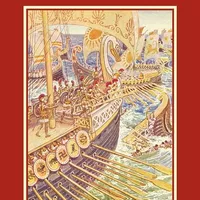46. The Adventures of Hannibal
"Attempt not to acquire that, which may not be retained." —FOUNDERS OF CARTHAGE.
Leaving Spain to the care of his younger brother Hasdrubal, Hannibal set out from New Carthage, with his Spanish troops, a number of horses, and thirty-seven elephants—set out to accomplish a feat, which still fills the world with wonder and admiration. Why he did not sail across the sea from New Carthage to Italy, with a fleet, is not known; he preferred to scale the mountain passes, which led him by land into the country he fain would make his own. Over the high Pyrenees, mountains which divide Spain from France, the army started and marched up the valley of the Rhone. Crossing the river at a spot "nearly four days' journey from the sea," they soon found themselves at the foot of the Alps. The passes of these sharply peaked mountains, which soar high above the snow-line, have always been the gate of traffic, between Italy and the rest of Europe. To-day a railway runs right through one of the passes and through the region of eternal snow.
Hannibal's difficulties now began. The one track over the mountains, was occupied in force by mountaineers, but Hannibal found out that these people always returned to their homes at night. So when darkness fell, he took his most active troops, and climbed up to the place, just left by the mountaineers.
Next morning, the rest of the army followed, winding slowly and painfully up the steep pass. The path was very narrow, and many of the horses and elephants lost their footing, and rolled headlong down the precipices, carrying the baggage with them. The whole army moved forward, descending into a rich valley, where the natives seemed friendly enough.
They now entered the narrow way, leading to the main mountain wall of the Alps; the one barrier, that yet separated Hannibal from the land of his hopes. Here the cliffs rose steeply above them and the torrent foamed angrily below; but they pushed bravely on, till suddenly, stones came thundering down, from the natives, on the heights, and it seemed for a time, as if the whole army must perish. Here, at the "white stone," which is still standing at the foot of the St Bernard Pass, Hannibal stood to arms the whole night through, while his army passed on upwards. On the ninth day, they reached the top, and a two days' rest was ordered. It was a sorry spot on which to recruit. It was late in October, snow lay thick on the peaks above, and the troops, drawn from burning Africa and sunny Spain, shivered in the keen mountain air. Depression seized them. Their ranks were sadly thinned, and the paths were getting more and more difficult, but the enthusiasm of their leader remained the same. In a few stirring words, he bid them keep up heart. Below their feet lay Italy—the land of their desire. "You are climbing not the walls of Italy only, but of Rome herself," cried Hannibal to his weary men. "After one or two battles we shall have the capital of Italy in our hands. Yonder," he cried, pointing away to the fair horizon, where he saw, in his mind's eye, the goal of all his hopes—"yonder lies Rome." The spirits of the soldiers rose, and amid falling snow, they began the descent. More dangers awaited them. They had to march over a steep and slippery ice slope, just covered with a thin coating of freshly fallen snow. Men, horses, and elephants slipped and rolled about, now sticking fast in a snowdrift, now falling into a chasm, now preferring death in the snow, to the struggle of going on. At last they reached a spot, where the track was lost and neither man nor beast could pass. Destruction once more stared them in the face. But Hannibal's pluck did not fail him. He set the soldiers to work to make a new road, over which he took the army. And so, at last they descended into the plains of Italy.
Hannibal had succeeded, but the sacrifice was enormous. More than half his men had perished; horses and elephants had died in that dreaded march of over 500 miles, in that month of misery. It was a wonderful feat; but still more wonderful was the fact that he defeated the whole Roman army, not once but twice, with his wayworn men, until there seemed nothing to bar his road, right on to the city of Rome.
The Gauls—those wild enemies of Rome—now joined him, and he led them over the Apennines and into the valley of the Arno. The melting of the snows on the mountains had caused the Arno to overflow, converting the plain into a vast swamp. For four days and nights the army toiled through the water, unable to find a dry spot, either to sit down or sleep. The horses fell in heaps, the Gauls grumbled loudly, Hannibal himself was tortured with inflammation in his eyes. He rode bravely onwards, on the one elephant that had survived, and escaped with only the loss of an eye.
On the shores of a great lake, not far from Rome, he met the Roman army. There was a thick fog, through which the Romans advanced, only to find, as the mist rolled away, that they were advancing into the jaws of death. Their whole army was cut up by Hannibal, and but few returned to carry back the sad tidings to Rome, to destroy the bridges over the Tiber, and prepare for the advance of Hannibal to their capital.

